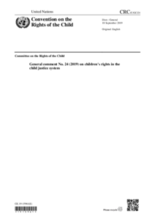Displaying 401 - 410 of 1510
This study aimed to assess differences in the level of post-traumatic symptoms reported by those who experienced commercial sexual exploitation of children (CSEC) during adolescence and those who did not.
This country care review highlights the care-related Concluding Observations from the Committee on the Rights of Persons with Disabilities.
The aim of this module from the book Rights-based Integrated Child Protection Service Delivery Systems is to review the service delivery systems for welfare, protection and justice for children in India.
The aim of this module from the book Rights-based Integrated Child Protection Service Delivery Systems is to learn to place children in specific alternative childcare services.
This general comment from the UN Committee on the Rights of the Child addresses children's rights in the child justice system. The general comment notes several concerns and recommendations regarding the deprivation of liberty of children, including the consideration of the child's best interests, the need to promote successful reintegration of children, and the recognition of the harm caused by deprivation of liberty.
The aim of this review is to analyse the existing published studies regarding these caregivers’ relationships, with a focus on programs in South Asia.
In this video, Sreyna and Chenda, two practitioners from Hagar Cambodia, discuss their learning regarding the impact of the care setting on child rehabilitation.
In this video, Dy Noeut and Kim Malin of New Smile Organisation (NSO) discuss their experience of conducting family tracing as a part of reintegration efforts in the context of an unregistered orphanage where children’s files contained missing and inaccurate information.
This study provides an illustration of a research design complementary to randomized controlled trial to evaluate program effects, namely, participatory peer research (PPR). The PPR described in current study was carried out in a small sample (N = 10) of young adults with mild intellectual disabilities (MID) and severe behavioral problems [in residential care in the Netherlands].
In this article, institutions in Russia, China, Ghana, and Chile are described with reference to the circumstances that lead to children’s institutionalization, resident children’s social-emotional relationships, and unique characteristics of each country’s institutional care (e.g., volunteer tourism in Ghana, and shifting demographics of institutionalized children in China).



